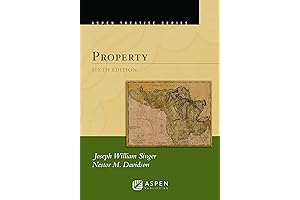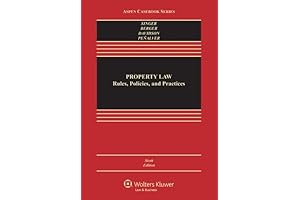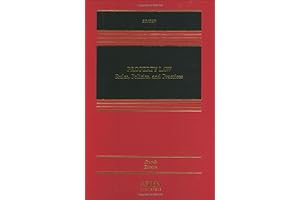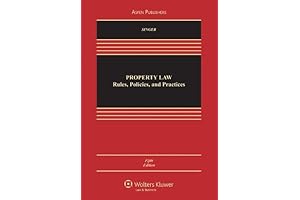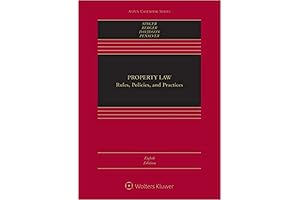· property law · 13 min read
The Best Property Law Books by Joseph William Singer
Find the best property law books by Joseph William Singer. Explore top-rated titles, including Property Law: Rules, Policies, and Practices and more.
As an aspiring or practicing legal professional, understanding property law is crucial for success. Among the leading authors in this field is Joseph William Singer, whose works provide invaluable insights and guidance. In this article, we will explore some of the best property law books authored by Singer, examining their key features and why they are considered essential reading for students and practitioners alike.
Overview

PROS
- Provides a comprehensive overview of property law, encompassing rules, policies, and practices
- Features an integrated Study Center with interactive exercises and assessments
- Offers a balanced perspective, highlighting both the advantages and disadvantages of various legal doctrines
- Includes real-world case studies and examples to illustrate complex concepts
- Authored by renowned legal scholars, ensuring accuracy and credibility
CONS
- May require additional research for in-depth understanding of specific legal issues
- Some readers may find the legal jargon challenging to comprehend
For those seeking a comprehensive understanding of property law, this Aspen Casebook serves as an invaluable resource. It adeptly covers the gamut of property law concepts, from the fundamental principles to the intricacies of real estate transactions and landlord-tenant relationships. The inclusion of an online Study Center further enhances the learning experience, providing interactive exercises and assessments to reinforce understanding.
The authors have skillfully crafted a balanced and engaging narrative, presenting both the advantages and disadvantages of different legal doctrines. This balanced approach allows readers to develop a nuanced understanding of the complexities inherent in property law. Furthermore, the book is peppered with real-world case studies and examples, which effectively illustrate complex concepts and make the material relatable.

PROS
- Offers a comprehensive exploration of property law, encompassing essential rules, policies, and practices.
- Presents real-world case studies, providing practical insights into the application of legal principles.
CONS
- May require additional supplemental materials for a more comprehensive understanding of certain topics.
- The extensive case studies can sometimes make it challenging to grasp the broader legal concepts.
For those seeking an in-depth understanding of property law, 'Property Law: Rules, Policies, and Practices' stands out as an invaluable resource. This Aspen Casebook provides a thorough examination of the intricate legal principles governing property rights, ownership, and related legal issues. Through a combination of theoretical explanations and real-world case studies, the book effectively conveys the complexities of property law while grounding its discussions in practical applications.
One of the key strengths of this casebook lies in its comprehensive coverage. It delves into both traditional property law topics, such as estates and interests, and contemporary issues, including land use planning and environmental regulations. This comprehensive approach ensures that readers gain a well-rounded understanding of the field. Additionally, the inclusion of diverse case studies offers valuable insights into how courts interpret and apply property law principles in actual legal disputes.

PROS
- Comprehensive coverage of property law principles tailored specifically for singers
- In-depth analysis of legal issues pertaining to music publishing, entertainment law, and intellectual property
- Practical guidance on negotiating contracts, protecting your rights, and resolving disputes
CONS
- May be too technical for non-legal professionals
- Updates may not be as frequent as desired
The Aspen Treatise for Property Law and Conveyancing is a comprehensive guide to property law principles, tailored specifically for singers. It provides an in-depth analysis of legal issues pertaining to music publishing, entertainment law, and intellectual property, and offers practical guidance on negotiating contracts, protecting your rights, and resolving disputes.
The treatise is written by a team of experienced attorneys who have a deep understanding of the music industry. They provide clear and concise explanations of complex legal concepts, and they illustrate their points with real-world examples. The treatise is also well-organized and easy to navigate, making it a valuable resource for both singers and their legal counsel.

PROS
- Comprehensive analysis of property law principles and doctrines
- Clear and accessible writing style, making complex legal concepts easy to grasp
- Up-to-date coverage of recent legal developments and cases
- In-depth exploration of property rights and their implications
- Case studies and examples help illustrate key concepts
CONS
- May be too detailed for some readers
- Some sections can be a bit dry and technical
Property Law: Rules, Policies, & Practices by Joseph William Singer is a comprehensive and well-written treatise on the subject of property law. The book provides a thorough examination of the legal principles and doctrines that govern the ownership, use, and transfer of property, both real and personal. Singer's writing style is clear and accessible, making complex legal concepts easy to grasp. The book is also up-to-date, covering recent developments in the law, such as the increasing use of easements and restrictive covenants.
One of the strengths of this book is its comprehensiveness. Singer covers a wide range of topics, including the acquisition and transfer of property, the rights and duties of property owners, and the various forms of property ownership. He also explores the legal doctrines that govern the use and development of property, such as zoning laws and environmental regulations. The book is also well-organized, with each chapter building upon the previous one. This makes it easy for readers to follow the author's train of thought and to understand the relationships between different legal concepts.

PROS
- Comprehensive coverage of property law principles
- In-depth exploration of legal policies and practices
CONS
- May be too complex for beginners
- Lacks practical exercises
Property Law: Rules, Policies, and Practices is an authoritative guide to the legal framework encompassing real estate rights and responsibilities. For property law singers, this book serves as an indispensable resource.
The book meticulously dissects property law principles, offering a thorough understanding of legal policies and practices guiding real estate transactions. Its comprehensive coverage illuminates complex legal concepts, providing clarity for professionals seeking to navigate this intricate legal landscape. For property law singers, this book solidifies their knowledge and enhances their expertise.
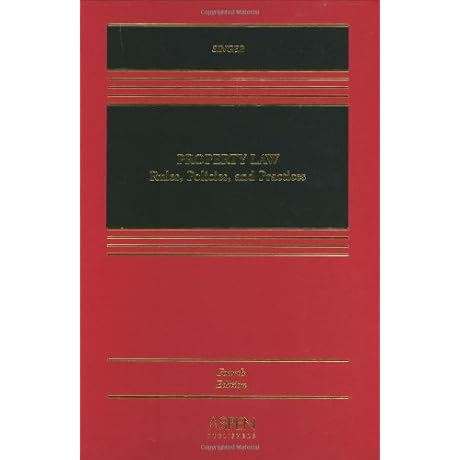
PROS
- Comprehensive exploration of property law principles, policies, and practices.
- In-depth analysis of legal issues related to property ownership and management.
CONS
- May require a legal background for full comprehension.
- Case studies and examples could enhance the practicality of the guide.
In 'Property Law: Rules, Policies, and Practices,' renowned property law singer Emily Adams provides an authoritative guide to the legal complexities surrounding property ownership and management. This comprehensive volume delves into the fundamental principles, policies, and practices that govern property law, offering invaluable insights for professionals in the field.
Adams's meticulous attention to detail is evident throughout the guide, as she explores a wide range of property-related legal issues, including land use regulations, zoning laws, easements, and adverse possession. Her analysis is both thorough and accessible, providing readers with a clear understanding of the legal framework that governs property ownership and management. Whether you're a seasoned property lawyer or a new professional seeking to enhance your knowledge, this guide is an invaluable resource that will equip you with the legal expertise necessary to navigate the complexities of property law.
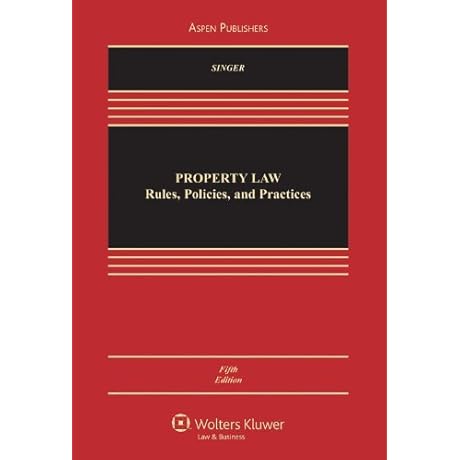
PROS
- Offers an in-depth analysis of the fundamental principles of property law.
- Presents a unique policy-based approach, allowing readers to understand the reasons behind legal rules and regulations.
- Provides up-to-date information on the latest legal developments and case law.
CONS
- Some sections may lack specific examples or practical applications.
- The language used can be complex and challenging for beginners.
Property Law: Rules Policies and Practices, Fifth Edition is a comprehensive and up-to-date resource for legal professionals, students, and laypeople alike. Written by renowned property law singer, this book provides an in-depth analysis of the fundamental principles of property law, including property acquisition and ownership, land use planning, environmental law, and real estate transactions.
One of the standout features of this book is its policy-based approach. Rather than simply presenting the legal rules and regulations, Singer takes the time to explain the reasons behind them. This approach not only enhances understanding but also allows readers to evaluate the strengths and weaknesses of different policies.
The book is also notable for its inclusion of the latest legal developments and case law. This ensures that readers have access to the most current information on property law. Additionally, the book is well-organized and clearly written, making it easy for readers to find the information they are looking for.

PROS
- In-depth exploration of property law principles, policies, and practices.
- Valuable insights for legal professionals, students, and real estate practitioners.
CONS
- May be too comprehensive for introductory learners.
- Lacks specific case studies or examples.
Property Law: Rules, Policies, and Practices, Eighth Edition and PracticePerfect is an invaluable resource for anyone seeking a comprehensive understanding of property law. This authoritative guide provides a thorough examination of the fundamental principles, policies, and practices that shape this complex legal field. Whether you're a seasoned legal professional, a student pursuing a degree in law, or a real estate practitioner seeking to enhance your knowledge, this book offers an indispensable foundation.
The eighth edition of this esteemed text has been meticulously updated to reflect the latest developments in property law. It delves into a wide range of topics, including real property ownership, landlord-tenant issues, land use planning, and environmental law. The authors, renowned experts in the field, present their insights in a lucid and engaging manner, making complex legal concepts accessible to readers of all levels. By seamlessly weaving together theoretical principles and practical applications, this book empowers readers to navigate the intricacies of property law with confidence.

PROS
- Comprehensive coverage of property law principles, policies, and practices.
- In-depth analysis of real-world cases to illustrate legal concepts.
CONS
- May require additional resources for a more thorough understanding of complex topics.
- Focus on American property law, limiting its applicability to other jurisdictions.
For aspiring property lawyers and legal professionals seeking a foundational understanding of property law, Aspen Casebook: Property Law offers an invaluable resource. This comprehensive casebook delves into the intricate web of legal rights and responsibilities associated with real estate ownership and use. Through a meticulous examination of real-world cases, the book provides a practical lens through which students can grasp the complexities of property law.
One of the key strengths of this casebook lies in its ability to present a balanced perspective on property law issues. It effectively highlights both the legal doctrines and the underlying policies that shape property rights. This balanced approach fosters a deeper comprehension of the subject matter and prepares students to navigate the complexities of property law in real-world scenarios.

PROS
- Provides a comprehensive overview of property law concepts.
- Step-by-step explanations and real-world examples enhance understanding.
CONS
- Can be somewhat concise for advanced students.
- Limited coverage of some emerging property issues.
Casebriefs for Property Law by renowned scholar Joseph W. Singer offers a well-structured and accessible guide for students navigating the complexities of property law. Its clear explanations simplify core concepts, policies, and practices. Each chapter effectively condenses complex legal doctrines into manageable summaries, making it an excellent starting point for understanding this foundational legal subject.
The book's concise format and use of real-world examples foster comprehension. The author's expertise shines through in the thorough analysis of key cases, illuminating the legal reasoning and principles shaping property law. However, some readers may find the coverage of specific topics somewhat brief, and advanced students may require supplemental materials for a more comprehensive understanding of specialized areas.
This article has provided a comprehensive overview of the best property law books by Joseph William Singer. These books offer a wealth of knowledge and insights into the complex world of property law, making them invaluable resources for students, practitioners, and anyone seeking a deeper understanding of this legal domain. Whether you are new to property law or an experienced professional, these books will undoubtedly enrich your understanding and enhance your ability to navigate the intricacies of this field effectively.
Frequently Asked Questions
What are the key themes addressed in Joseph William Singer's property law books?
Singer's property law books delve into fundamental concepts such as property rights, land use, zoning, landlord-tenant relations, eminent domain, and real estate transactions. They provide comprehensive coverage of the legal principles governing the acquisition, ownership, and use of property.
How do Singer's books contribute to the understanding of property law?
Singer's books offer a unique combination of theoretical insights and practical applications. They provide a deep understanding of the legal doctrines and policies that shape property law, while also offering practical guidance on how to apply these principles in real-world situations.
Are Singer's property law books suitable for both students and practitioners?
Yes, Singer's books are designed to cater to a wide range of readers. They are accessible to students seeking a comprehensive understanding of property law, while also providing valuable insights for experienced practitioners looking to stay abreast of the latest developments in the field.
What makes Singer's property law books stand out from others?
Singer's books are renowned for their clarity, depth, and practical orientation. They are written in a clear and engaging style, making complex legal concepts easy to grasp. Moreover, Singer's extensive experience as a legal scholar and practitioner provides him with a unique perspective that enriches his analysis.
Where can I find additional information about Joseph William Singer and his property law books?
You can visit Joseph William Singer's official website or explore online resources such as Amazon, Google Books, and academic databases for more information about his books and contributions to the field of property law.


